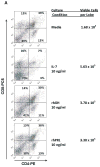Neuroendocrine hormones such as growth hormone and prolactin are integral members of the immunological cytokine network
- PMID: 18313040
- PMCID: PMC4777337
- DOI: 10.1016/j.cellimm.2007.12.003
Neuroendocrine hormones such as growth hormone and prolactin are integral members of the immunological cytokine network
Abstract
Neuroendocrine hormones such as growth hormone (GH) and prolactin (PRL) have been demonstrated to accelerate the recovery of the immune response after chemotherapy and bone marrow transplantation and to enhance the restoration of immunity in individuals infected with HIV and in normal individuals with compromised immune systems associated with aging. As the mechanism of action of these hormones has been elucidated, it has become clear that they are integral members of the immunological cytokine/chemokine network and share regulatory mechanisms with a wide variety of cytokines and chemokines. The members of this cytokine network induce and can be regulated by members of the suppressor of cytokine signaling (SOCS) family of intracellular proteins. In order to take advantage of the potential beneficial effects of hormones such as GH or PRL, it is essential to take into consideration the overall cytokine network and the regulatory effects of SOCS proteins.
Figures


Similar articles
-
Expression of SOCS genes in normal and leukemic human leukocytes stimulated by prolactin, growth hormone and cytokines.J Neuroimmunol. 2000 Sep 1;109(1):34-9. doi: 10.1016/s0165-5728(00)00300-3. J Neuroimmunol. 2000. PMID: 10969179
-
Suppressor of cytokine signaling 7 inhibits prolactin, growth hormone, and leptin signaling by interacting with STAT5 or STAT3 and attenuating their nuclear translocation.J Biol Chem. 2005 Apr 8;280(14):13817-23. doi: 10.1074/jbc.M411596200. Epub 2005 Jan 26. J Biol Chem. 2005. PMID: 15677474
-
Inhibition and restoration of prolactin signal transduction by suppressors of cytokine signaling.J Biol Chem. 1999 Aug 27;274(35):24497-502. doi: 10.1074/jbc.274.35.24497. J Biol Chem. 1999. PMID: 10455112
-
Protein hormones and immunity.Brain Behav Immun. 2007 May;21(4):384-92. doi: 10.1016/j.bbi.2006.11.010. Epub 2007 Jan 2. Brain Behav Immun. 2007. PMID: 17198749 Free PMC article. Review.
-
Prolactin and growth hormone signal transduction in lymphohaemopoietic cells.Cell Mol Life Sci. 1998 Oct;54(10):1067-75. doi: 10.1007/s000180050235. Cell Mol Life Sci. 1998. PMID: 9817985 Free PMC article. Review.
Cited by
-
Metabolic and hormonal signatures in pre-manifest and manifest Huntington's disease patients.Front Physiol. 2014 Jun 23;5:231. doi: 10.3389/fphys.2014.00231. eCollection 2014. Front Physiol. 2014. PMID: 25002850 Free PMC article.
-
Neuroendocrine interactions in the immune system.Cell Immunol. 2008 Mar-Apr;252(1-2):1-6. doi: 10.1016/j.cellimm.2008.05.006. Epub 2008 Jul 10. Cell Immunol. 2008. PMID: 18619587 Free PMC article.
-
The effects of growth hormone on therapy resistance in cancer.Cancer Drug Resist. 2019 Summer;2(3):827-846. doi: 10.20517/cdr.2019.27. Epub 2019 Sep 19. Cancer Drug Resist. 2019. PMID: 32382711 Free PMC article.
-
Potential Roles of Peripheral Dopamine in Tumor Immunity.J Cancer. 2017 Aug 25;8(15):2966-2973. doi: 10.7150/jca.20850. eCollection 2017. J Cancer. 2017. PMID: 28928888 Free PMC article. Review.
-
Rejuvenation of the aging thymus: growth hormone-mediated and ghrelin-mediated signaling pathways.Curr Opin Pharmacol. 2010 Aug;10(4):408-24. doi: 10.1016/j.coph.2010.04.015. Epub 2010 Jun 4. Curr Opin Pharmacol. 2010. PMID: 20595009 Free PMC article. Review.
References
-
- Murphy WJ, Tsarfaty G, Longo DL. Growth hormone exerts hematopoietic growth-promoting effects in vivo and partially counteracts the myelosuppressive effects of azidothymidine. Blood. 1992;80:1443–7. - PubMed
-
- Murphy WJ, Durum SK, Longo DL. Role of neuroendocrine hormones in murine T cell development. Growth hormone exerts thymopoietic effects in vivo. J Immunol. 1992;149:3851–7. - PubMed
-
- Tian ZG, Woody MA, Sun R, Welniak LA, Raziuddin A, Funakoshi S, Tsarfaty G, Longo DL, Murphy WJ. Recombinant human growth hormone promotes hematopoietic reconstitution after syngeneic bone marrow transplantation in mice. Stem Cells. 1998;16:193–9. - PubMed
-
- Woody MA, Welniak LA, Richards S, Taub DD, Tian Z, Sun R, Longo DL, Murphy WJ. Use of neuroendocrine hormones to promote reconstitution after bone marrow transplantation. Neuroimmunomodulation. 1999;6:69–80. - PubMed
Publication types
MeSH terms
Substances
Grants and funding
LinkOut - more resources
Full Text Sources
Research Materials

